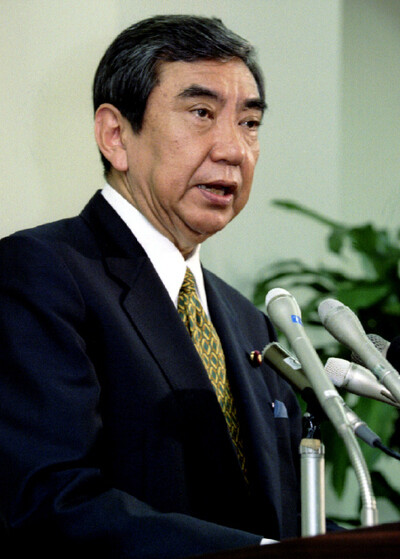hankyoreh
Links to other country sites 다른 나라 사이트 링크
Japan’s Kono report stirs domestic debate in Japan

By Gil Yun-hyung, Tokyo correspondent
The Japanese government panel’s review report on the Kono Statement is also being fiercely debated inside Japan.
Yohei Kono, the former Chief Cabinet Secretary who was the main player behind the release of the 1993 Kono Statement, reiterated in a lecture on June 21 that the “comfort women system was compulsory.”
In the Kono Statement, the Japanese government acknowledged the forcible nature of the recruitment of the comfort women and the involvement of the Japanese imperial army.
“The comfort women may have been recruited through a variety of means, but once they entered the comfort stations, they had to obey the commands of the military to work. If they couldn’t refuse these commands, it is only natural to view this as being compulsory,” Kono said.
The Japanese government is avoiding the crux of the issue and calling the Kono Statement into question through nitpicking about whether or not the recruitment of the comfort women was compulsory, but Kono’s remarks affirm the generally understood view that the comfort women system was compulsory.
In Japanese media and politics, there is a sharp divide on the issue. In a June 21 editorial, right-leaning Japanese newspaper the Yomiuri Shimbun asserted that the statement had exerted a harmful effect. “The Kono Statement prioritized diplomatic niceties over the facts and is perpetuating the misunderstanding around the world that the Japanese government rounded up women and forced them to become sexual slaves,” the editorial said. The far-right Sankei Shimbun even used this as an opportunity to call for a revision of the Kono Statement.
“What the government ought to be doing now is devising diplomatic policies that bear in mind Japan’s long-term national interest. It needs to stop taking issue with the Kono Statement and to think about a future-oriented relationship with South Korea,” the Nihon Keizai Shimbun newspaper said. The Asahi Shimbun newspaper suggested that the report also to some extent defends the claims of Japanese right-wingers who are trying to overturn the Kono Statement.
The immediate reason for the government’s review of the Kono Statement was the Sankei Shimbun’s printing of the transcript of testimony given by 16 Korean former comfort women during the process of preparing the Kono Statement and questioned the credibility of their testimony. But the report indicates that the Japanese government had completed a first draft of the statement before the former comfort women testified (July 26-30, 1993), and that their testimonies did not affect the statement.
Koichi Hagiuda, aide to Japanese Prime Minister Shinzo Abe, said that he thought the report was significant in the sense that it clarified some of the facts for the Japanese people. “We need to create an English version of the report and provide it to countries where there are efforts to set up statues to the comfort women,” Hagiuda said. The politician also took aim at Kono, suggesting that he could be summoned before the Japanese Diet for questioning.
Banri Kaieda, president of the Democratic Party of Japan, the country’s main opposition party, maintained a neutral position, saying that he “accepted the report as factual.”
“The important thing is that we are not revising the statement. It is important that we maintain our stance of apology and contrition,” said Natsuo Yamaguchi, president of the New Komeito Party, which is allied with the ruling party.
Please direct questions or comments to [english@hani.co.kr]

Editorial・opinion
![[Editorial] Does Yoon think the Korean public is wrong? [Editorial] Does Yoon think the Korean public is wrong?](https://flexible.img.hani.co.kr/flexible/normal/500/300/imgdb/original/2024/0417/8517133419684774.jpg) [Editorial] Does Yoon think the Korean public is wrong?
[Editorial] Does Yoon think the Korean public is wrong?![[Editorial] As it bolsters its alliance with US, Japan must be accountable for past [Editorial] As it bolsters its alliance with US, Japan must be accountable for past](https://flexible.img.hani.co.kr/flexible/normal/500/300/imgdb/original/2024/0417/6817133413968321.jpg) [Editorial] As it bolsters its alliance with US, Japan must be accountable for past
[Editorial] As it bolsters its alliance with US, Japan must be accountable for past- [Guest essay] Amending the Constitution is Yoon’s key to leaving office in public’s good graces
- [Editorial] 10 years on, lessons of Sewol tragedy must never be forgotten
- [Column] A death blow to Korea’s prosecutor politics
- [Correspondent’s column] The US and the end of Japanese pacifism
- [Guest essay] How Korea turned its trainee doctors into monsters
- [Guest essay] As someone who helped forge Seoul-Moscow ties, their status today troubles me
- [Editorial] Koreans sent a loud and clear message to Yoon
- [Column] In Korea’s midterm elections, it’s time for accountability
Most viewed articles
- 1[Column] The clock is ticking for Korea’s first lady
- 2[News analysis] After elections, prosecutorial reform will likely make legislative agenda
- 3Samsung barricades office as unionized workers strike for better conditions
- 4S. Korea, Japan reaffirm commitment to strengthening trilateral ties with US
- 5[Editorial] When the choice is kids or career, Korea will never overcome birth rate woes
- 6Why Israel isn’t hitting Iran with immediate retaliation
- 7Korea, Japan jointly vow response to FX volatility as currencies tumble
- 8[Editorial] Does Yoon think the Korean public is wrong?
- 9Strong dollar isn’t all that’s pushing won exchange rate into to 1,400 range
- 10[Guest essay] How Korea turned its trainee doctors into monsters